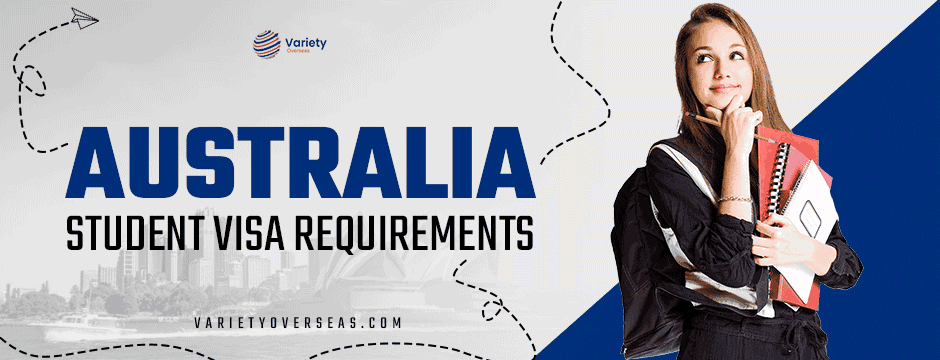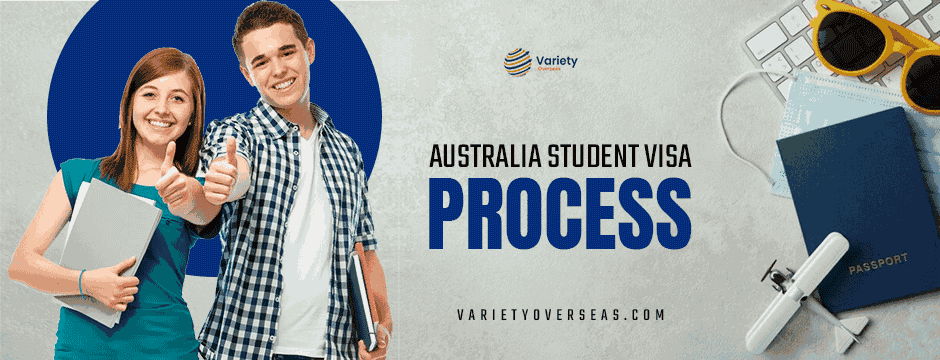Australia is a top choice for international students. Its excellent education system, vibrant culture, and global career opportunities attract thousands of students annually. However, one key requirement for securing an Australian student visa is proving your English language proficiency.
This blog explains the process, accepted tests, scores, and tips to meet the Australia student visa requirements.

Why Does a Student Visa to Australia Require English Proficiency?
In Australia, the majority of courses are delivered in English. The government needs to ensure students can understand lectures, complete assignments, and participate in activities.
Proving your English language skills ensures you will:
- Succeed academically in your chosen program.
- Integrate easily into Australian society.
- Avoid communication barriers in daily life.
Accepted English Language Tests for an Australia Student Visa
Australia accepts several standardized English tests. Each test assesses your speaking, listening, reading, and writing skills.
Here are the commonly accepted tests:
- IELTS (International English Language Testing System)
- Widely accepted and recognized worldwide.
- Test Format: Academic or General Training.
- Score Requirement: Minimum 5.5 (varies by institution and visa subclass).
- TOEFL iBT (Test of English as a Foreign Language)
- Internet-based tests focused on academic English.
- Test Format: Online only.
- Score Requirement: Minimum 46.
- PTE Academic (Pearson Test of English)
- A computer-based test with fast results.
- Test Format: Academic English.
- Score Requirement: Minimum 42.
- Cambridge English (CAE – Advanced)
- Recognized globally for academic and professional purposes.
- Test Format: Paper or computer-based.
- Score Requirement: Minimum 162.
- Occupational English Test (OET)
- Designed for healthcare professionals.
- Test Format: Focuses on workplace scenarios.
- Score Requirement: Minimum B grade.
English Proficiency Requirements by Visa Subclass
Your required English language score depends on the Australia student visa process, including your visa subclass and institution requirements.

Subclass 500 (Student Visa)
Most students apply for this visa. Common requirements include:
- Vocational Education: IELTS 5.5 or equivalent.
- Higher Education: IELTS 6.0 or equivalent.
Other Categories
- For postgraduate research, scores are usually higher.
- Some institutions accept conditional offers if you agree to take additional language courses in Australia.
How to Prepare for Your English Language Test
Preparing for an English test can feel overwhelming. Here are some simple steps to ensure success:
1. Understand the Test Format
- Visit the official website of your chosen test.
- Learn about each section: Listening, Reading, Writing, and Speaking.
- Take practice tests to improve yourself with the question types.
2. Enroll in an English Course
- Join a certified English preparation class.
- Focus on weak areas like grammar, vocabulary, or pronunciation.
- Many courses also provide mock tests and feedback.
3. Practice Daily
- Read English books, newspapers, or online articles.
- Watch English-language YouTube videos, TV series, or films.
- Speak in English with friends or join language exchange groups.
4. Take Mock Tests
- Schedule practice tests to simulate real exam conditions.
- Time yourself and analyze your mistakes after each test.
5. Use Online Resources
- Many websites offer free study material, quizzes, and practice tests.
- Apps like Duolingo, Babbel, and Grammarly can improve your skills.
Tips for Scoring High to Meet Australia Student Visa Requirements in English Proficiency Tests
To achieve the required scores in your English proficiency test for an Australia student visa, it’s crucial to focus on effective strategies for each section: listening, reading, writing, and speaking. Here are some practical tips to help you succeed in each area:
Listening Section
The listening section is designed to assess your ability to understand spoken English. One of the best strategies is to listen carefully to the instructions and questions before the audio begins. Pay attention to details like tone, context, and key information. During the listening test, focus on noting keywords and main ideas as you hear them. This will help you answer questions more accurately, as sometimes the answers are hidden within broader contexts or subtle details. Practice by listening to English podcasts, news, and conversations to improve your understanding of different accents and speech patterns.
Reading Section
The reading portion examines your knowledge of the text. Before diving into the questions, skim the passage for an overview of the content. This will help you understand the main ideas, structure and help you answer questions faster more accurately. Practising reading for both speed and comprehension is essential. You should be able to quickly identify key points, such as the main argument or supporting details, without getting bogged down in minor details. Regular reading of newspapers, articles, and books in English will help improve both your speed and comprehension.
Writing Section
The writing section requires you to organize your thoughts clearly. Planning your essay or letter structure is critical to ensuring your ideas flow logically. Use clear, simple sentences with correct grammar to convey your message effectively. Avoid complex sentence structures that might lead to mistakes. If you’re unsure about your writing skills or need guidance, seeking help from the best visa consultants in Chandigarh can provide valuable feedback and advice on improving your writing. Practicing writing essays on various topics and getting expert feedback can help you refine your writing skills and boost your confidence.

Speaking Section
In the speaking section, it’s important to speak confidently and clearly, even if you make small mistakes. The examiner is looking for communication skills rather than perfection. Avoid long pauses by thinking about key ideas beforehand, which will help you stay on track during the conversation. Regular practice with a language partner or tutor can enhance your speaking fluency.
What If You Don’t Meet the Requirements?
If your English proficiency score falls short, don’t worry. There are alternative solutions available, and the best visa consultants in Punjab can guide you through options like retaking tests or enrolling in bridging courses to improve your skills and meet the requirements.
- Take a Bridging Course
- Many Australian institutions offer English Language Intensive Courses for Overseas Students.
- These courses improve your English and prepare you for academic success.
- Retake the Test
- Use your experience from the first test to improve.
- Focus on weak areas and practice regularly.
- Check for Conditional Offers
- Some universities accept students with lower scores if they agree to complete language courses before starting their main program.
Frequently Asked Questions
1. Do I need an English test if I studied in English before?
- You may be exempt if you studied in an English-speaking country for at least five years. Check with your institution or visa officer.
2. Can I use my test score for multiple applications?
- Yes, as long as the score is valid.
3. What happens if I fail the test?
- You can retake the test after some preparation or choose alternative ways.
4. Are there any fee waivers for these tests?
- Test fees are usually mandatory. However, scholarships might cover the costs in some cases.
5. Can I work while improving my English in Australia?
- Yes, as a student visa holder, you can work up to 48 hours per fortnight during your study period.
Conclusion
Meeting the Australia student visa requirements for English language proficiency is entirely achievable with the right approach. By selecting the appropriate test, practising consistently, and seeking support when needed, you can definitely meet these essential criteria.
Fulfilling these requirements not only helps you secure your visa but also prepares you for a successful academic and social experience in Australia.
Take the first step today with Variety Overseas and set yourself up for a bright future in the land of opportunities!
